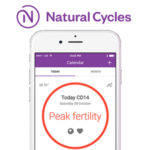 Natural Cycles, the fertility app developed by former CERN particle physicist Elina Berglund, is reportedly as effective at preventing pregnancy as oral contraceptives or condoms, boasting a 99.5% efficacy rate.
Natural Cycles, the fertility app developed by former CERN particle physicist Elina Berglund, is reportedly as effective at preventing pregnancy as oral contraceptives or condoms, boasting a 99.5% efficacy rate.
Berglund began working on the app while she was still at the particle physics laboratory in Geneva, she told Wired.
“I wanted to give my body a break from the pill,” she said, “but I couldn’t find any good forms of natural birth control, so I wrote an algorithm for myself.”
Using statistical methods learned during her time at CERN, Berglund’s algorithm uses daily body temperature readings to determine fertility. Increased levels of progesterone can warm women’s bodies by up to 0.45°C (0.81°F). The app lets users input their daily temperature readings; its calendar turns green if it’s safe to have unprotected sex or red to indicate the need for contraception.
The app is the only of its kind to be regulated as an approved medical device. Natural Cycles has 100,000 users who pay $7.70 (£6.99) each month. With the $6 million (£4.5 million) that the company received in a series A funding round last June, Berglund hopes to expand the U.K. team and begin additional trials.
The app is not without critics, who say that there are more effective methods of contraception on the market already. “Natural Cycles is not recommended to those who are very young or very keen to avoid a pregnancy, since there are other more effective methods,” Kristina Gemzell Danielsson, from Swedish medical institute Karolinska Institutet, told Wired. “The efficacy is far below that of intrauterine contraception or implants, but similar to that of the pill when used in real life.”
The company’s 2nd clinical trial analyzed data from more than 4,000 women aged 20-35. In 1 year, there were 143 unplanned pregnancies and 10 of those occurred on green days.
Moving forward, Berglund hopes to get the app classified as a contraceptive, instead of a fertility monitor. The company also launched a campaign in the UK this month called “#HappyPregnancy”, to encourage women to use the app’s features to help plan their pregnancy. Natural Cycles has offered to refund any woman who does not conceive within 9 months of using the app, as a part of the campaign.
Berglund recently hired a physicist from CERN to analyze the data that the app collects, according to Wired. She hopes that rigorous analysis and testing will convince women that her app is a secure method of contraception. “It can be very scary, especially when it has to do with your body and your health,” she said. “We know we are dealing with women’s lives here and we take that very seriously.”

First of all, based on the 2nd clinical trial data, 143 unplanned pregnancies out of 4000 women is 3.5% which makes the efficiency rate 96.5, not 99.5% which is a big difference when you’re talking about unwanted pregnancies. Second, what about people like me, I’m 34 and i just recently was diagnosed with a vascular disorder that I’ve likely had since my teens but I was unaware of what caused my symptoms. My temperature goes from 96 degrees to 100 degrees in minutes and I’m usually around 97. I think basing whether you can have unprotected sex or not solely on your body temperature is playing with fire. Lots of things can affect your body temperature including foods you eat, the time of day, medications etc etc, are there fields for all of this data so it can be effectively factored into the equation? Not likely. I could see how this might be helpful as an ADDITIONAL tool for women TRYING to get pregnant, I mean if they don’t then it’s not the end of the world but I think this is a terrible idea to use as the only birth control method. In addition to other types of protection, sure, but body temperature is not a surefire way to determine your fertility and I hope people are at least cautioned about that.